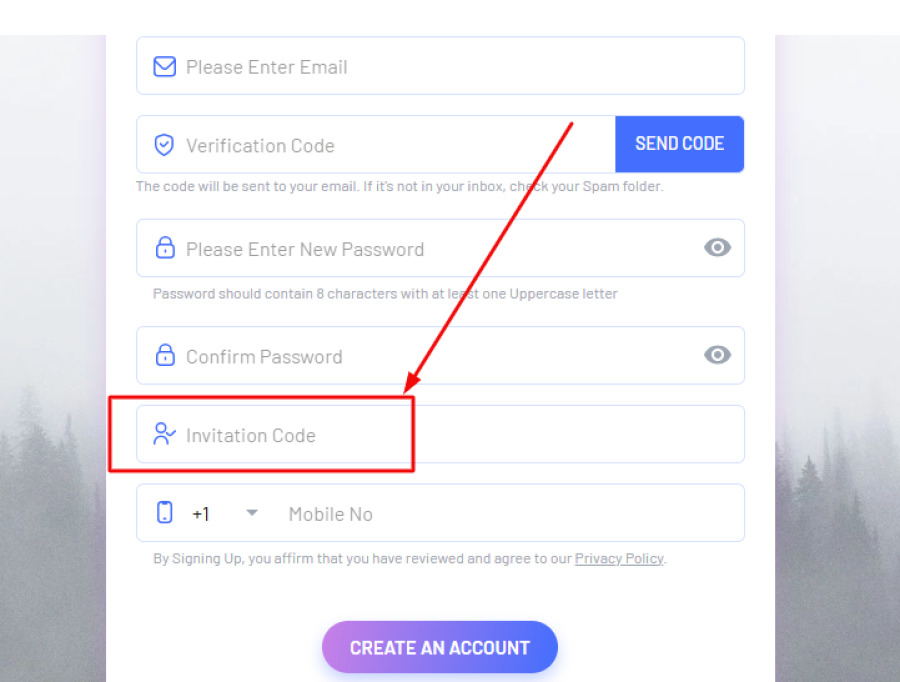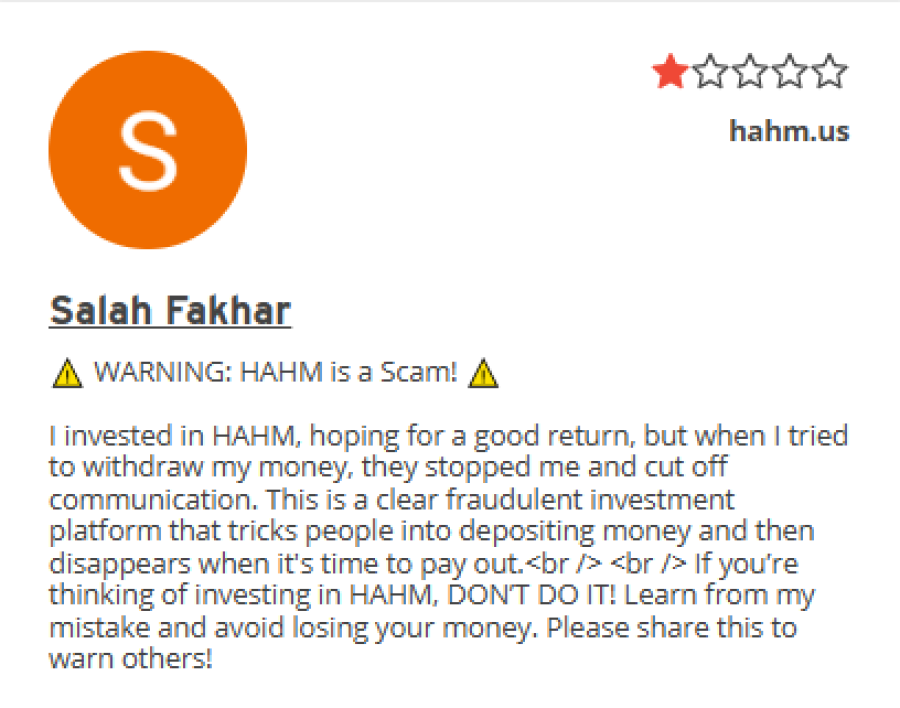Is Hahm.us Legit or a Scam? A Detailed Review

Author: Adam Collins
A lot of people on ScamAdviser are asking the same question: Is Hahm.us a real way to make money, or is it just another online scam? At first glance, it looks like an easy way to earn cash by completing tasks, but a deeper look raises some serious concerns. From its shady sign-up process to its mysterious ownership and concerning customer complaints, there are plenty of reasons to be skeptical. Let’s break it down.
How Does Hahm.us Work?
Hahm.us claims to offer users a chance to make money by completing simple online tasks, such as rating and reviewing products. This kind of model isn’t unusual, and legitimate platforms do exist. However, there’s a major catch—joining Hahm.us requires a reference link. This means you can’t just sign up on your own; you need someone to invite you, which is a classic red flag.

Why is that a problem? Referral-based systems often operate like pyramid schemes, where older members profit from new recruits instead of an actual product or service. If the only way to make money is by bringing in more people, that’s a Ponzi scheme waiting to collapse.
Is It Hahm.us or Hahm.world?
A particularly strange thing about Hahm.us is its frequent mention of another website: Hahm.world. Why would a supposedly legitimate site direct users to a different domain?

Scam websites often create multiple versions of themselves, so if one gets exposed and shut down, they can continue the scheme under a slightly different name. The fact that Hahm.us keeps referencing Hahm.world raises serious concerns about its credibility. It’s also worth noting that scam websites sometimes rotate between different domains to make tracking and accountability more difficult.
Who Owns Hahm.us?
If you visit Hahm.us’s About Us page now, you’ll see names, job titles, and contact details alongside the pictures of their team. Previously, there were only faceless images with no identifying information. While this may seem like a step toward transparency, a deeper look raises more questions.

A search for these officials turns up nothing—no LinkedIn profiles, no online presence, nothing to verify who they really are. Legitimate businesses take pride in their leadership and transparency, but Hahm.us seems to be filling in the blanks without providing real proof. If you can’t confirm who’s behind the platform, how can you trust them with your money?
Hahm.us Customer Reviews
User feedback is one of the best ways to gauge a platform’s trustworthiness. When it comes to Hahm.us, the reviews aren’t looking good.

One particularly alarming review states:
“I invested in HAHM, hoping for a good return, but when I tried to withdraw my money, they stopped me and cut off communication. This is a clear fraudulent investment platform that tricks people into depositing money and then disappears when it’s time to pay out.
If you’re thinking of investing in HAHM, DON’T DO IT! Learn from my mistake and avoid losing your money.....”
Interestingly, on their website, they have glowing recommendations and reviews, with many seeming to praise the company. However, the reviews seem generic, with almost all of them talking about “professionalism” and “customer support,” but none seem to share what kind of service they received.

When users report being unable to withdraw their money, that’s a massive warning sign. Scam platforms often lure people in with the promise of easy earnings, only to make it impossible to cash out.
Bottom Line: Is Hahm.us a Scam?
Overall, there is a high possibility that Hahm.us may be a scam.
- The platform requires a referral link to join, which is a classic pyramid scheme tactic.
- It frequently references a different website, Hahm.world, which raises credibility concerns.
- The ownership is completely anonymous, with no names, job titles, or contact information available.
- Customer reviews suggest that users have lost money and were unable to withdraw their earnings.
With all these red flags, it’s hard to see Hahm.us as anything other than a highly suspicious platform. If you’re thinking about investing your time or money here, you might want to reconsider.
This article has been written by a scam fighter volunteer. If you believe the article above contains inaccuracies or needs to include relevant information, please contact ScamAdviser.com using this form.
Report a Scam!

Have you fallen for a hoax, bought a fake product? Report the site and warn others!
Scam Categories
Help & Info
Popular Stories
As the influence of the internet rises, so does the prevalence of online scams. There are fraudsters making all kinds of claims to trap victims online - from fake investment opportunities to online stores - and the internet allows them to operate from any part of the world with anonymity. The ability to spot online scams is an important skill to have as the virtual world is increasingly becoming a part of every facet of our lives. The below tips will help you identify the signs which can indicate that a website could be a scam. Common Sense: Too Good To Be True When looking for goods online, a great deal can be very enticing. A Gucci bag or a new iPhone for half the price? Who wouldn’t want to grab such a deal? Scammers know this too and try to take advantage of the fact. If an online deal looks too good to be true, think twice and double-check things. The easiest way to do this is to simply check out the same product at competing websites (that you trust). If the difference in prices is huge, it might be better to double-check the rest of the website. Check Out the Social Media Links Social media is a core part of ecommerce businesses these days and consumers often expect online shops to have a social media presence. Scammers know this and often insert logos of social media sites on their websites. Scratching beneath the surface often reveals this fu
So the worst has come to pass - you realise you parted with your money too fast, and the site you used was a scam - what now? Well first of all, don’t despair!! If you think you have been scammed, the first port of call when having an issue is to simply ask for a refund. This is the first and easiest step to determine whether you are dealing with a genuine company or scammers. Sadly, getting your money back from a scammer is not as simple as just asking. If you are indeed dealing with scammers, the procedure (and chance) of getting your money back varies depending on the payment method you used. PayPal Debit card/Credit card Bank transfer Wire transfer Google Pay Bitcoin PayPal If you used PayPal, you have a strong chance of getting your money back if you were scammed. On their website, you can file a dispute within 180 calendar days of your purchase. Conditions to file a dispute: The simplest situation is that you ordered from an online store and it has not arrived. In this case this is what PayPal states: "If your order never shows up and the seller can't provide proof of shipment or delivery, you'll get a full refund. It's that simple." The scammer has sent you a completely different item. For example, you ordered a PlayStation 4, but instead received only a Playstation controller. The condition of the item was misrepresented on the product page. This could be the